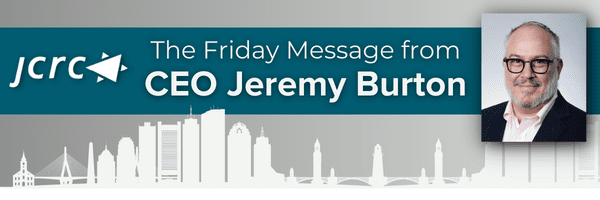With the fast of Tisha B’Av (9th day of Av) – a day for mourning the destruction of the two temples in Jerusalem – this Sunday, I find myself contemplating troubling trends within our Jewish community. Specifically, the growing toxicity of our communal discourse and our inclination to blame each other for the actions of those outside the Jewish community who mean to do us harm.
It would be fair to say that this behavior of blame has been going on for centuries. Something we often describe when preparing civic leaders to visit Yad Vashem is how, after the Holocaust, there were those at opposite ideological polls of the Jewish discourse who blamed other Jews for causing the Shoah.
And though this is not new, it is on my mind of late because I see this behavior increasingly showing up in my inbox. After a white supremacist attacks a Jewish institution, I get notes from some who say that “if only” certain other Jews (not them, of course) did certain things differently, these attacks would not happen. And again, after the Mapping Project and its public clarification of a particular form of left antisemitism, the notes and calls arrived – telling me that if only we Jews did certain things differently, maybe these antisemites wouldn’t come at us.
I couldn’t help noticing that these “it’s the Jews who are to blame” notes in recent weeks didn’t, themselves, map onto a neat left/right narrative. It wasn’t only members of our community with one ideological stance that were blaming other Jews for these troubles. It was diverse members of our community, who each see themselves as “the good Jews” (and maybe even the ‘only’ good Jews), and who see the rest of us as part of the cause of our own troubles.
Again, this is not new. It comes very naturally to a people that has been oppressed for, quite literally, thousands of years. We ask ourselves why anti-Jewishness is so persistent. And at times it is too easy to offer the incorrect answer that comes with internalizing our oppression: We blame ourselves. We blame other Jews. We blame our institutions and our leaders. We tell ourselves that our troubles are caused by what we do and believe, rather than because of who they (our oppressors) are and what they believe.
Now please, don’t mistake me as suggesting that we should table our internal disputes, or that we should not engage in critique of each other and our institutions. But it is one thing to debate and argue, lovingly, for different ideas of what it means to live as Jews, and for different aspirational visions for our future as one people. It is quite another thing to openly tear down other members of our community and to question their very legitimacy as Jews. It is one thing to express constructive critique of leaders and to debate and weigh strategies for confronting antisemitism. It is quite another thing when Jews, in claiming the mantle of serving the Jewish people, evoke the same language used by the antisemites, saying that (other) Jews are a ‘threat’ to our community, one that must be dismantled or removed.
I say all this with the caution that I do not wish to be seen as pointing a finger of j’accuse at one faction or ideology in our community. I offer this perspective rather to explain that from the seat I am privileged to sit in, I see this toxic self-blame showing up in all sorts of ways in our community.
As we head into Tisha B’Av I am reminded that the rabbis of the Talmud taught that a cause of the destruction of the Temple was the baseless hatred sown between Jews. While this teaching may be familiar to many in our community, maybe now is a good time to tell ourselves that our tendency to blame ourselves, and other Jews, for rising antisemitism is, in fact, misplaced. And still, also, let’s use this fast to forgive ourselves and those among us who – in sowing fear in troubling times like these – also seek to turn us against each other and against our own community. Their tendency to live in fear, and to blame other members of our community, is a natural outcome of the centuries of trauma that they and we carry with us.
With hope for a future in which we overcome our trauma and heal each other,
Shabbat Shalom (and wishing an easy fast to those who will be doing so on Sunday),
Jeremy


